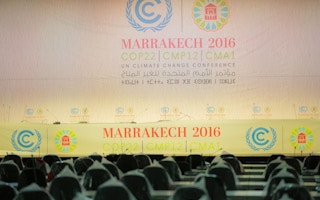It has been almost a year since the Paris Agreement on climate change was signed in France last December; the historic accord has since triggered an unprecedented wave of commitment on climate action from the global community, governments and corporate leaders alike.
Since then, 192 of the 197 members of the United Nations Framework Convention on Climate Change (UNFCCC) have signed it; among which 100 have ratified it, formally putting the agreement into force this week — one of the fastest for any international deal.
This week, the world’s eyes are on Marrakesh, Morocco, where global leaders will gather to begin the hard work of implementing the measures outlined in the Paris Agreement.
This includes capping global temperature rise at 2 degrees Celsius, and achieving net zero emissions by 2050, among other aims.
Countries now have to fulfil their climate pledges, known as Nationally Determined Contributions (NDCs).
Key to the discussions in Morocco would be how the UNFCCC will measure and track the delivery of the NDCs transparently and fairly, and how to do regular “stock-taking” of the pledges to ensure the agreement targets are met.
New task ahead
The group tasked with overseeing the process is known as the Conference of the Parties serving as the meeting of the Parties to the Paris Agreement, or simply the CMA. It was formed after the Agreement went into force and will meet for the first time on November 15 — a high-level affair with addresses from the king of Morocco and global heads of state.
Meanwhile, the Ad Hoc Working Group on the Paris Agreement (APA) — set up a few months before the Paris meeting last year — will continue discussions on how to implement the deal, and will pass its findings along to the CMA during the conference.
One key issue the APA will have to iron out is how to measure, report, and verify greenhouse gas emissions and removals.
This will require a global framework to ensure countries are transparent about their efforts. The APA will also have to set out how to conduct a five-year review of pledges, known as a “global stocktake”.
The APA’s challenge is to walk a fine line between making sure that reports are substantial and transparent enough, and at the same time do not impinge on the sovereignty of countries.
Another major issue up for discussion in Marrakesh is transparency of support. The Paris Agreement requires countries to be open not only about the actions they are taking to mitigate climate change, but also the support they are giving or receiving.
In reality, this means that when developing countries ask for aid, they must offer detailed explanations for what the funding will be spent on, and justify the amount they are asking for.
Melissa Low, research associate at the National University of Singapore’s Energy Studies Institute notes that while this is fair in principle, it can introduce more bureaucratic barriers before developing countries can get much-needed resources for adaptation and mitigation efforts. Many INDCs contain commitments that are contingent on means of support, i.e., receiving international climate finance. Thus, it is critical that financial resources mobilised are additional to existing ones and are easily accessible.
It is therefore essential that even as negotiators pin down procedures — or in UN terms, modalities, procedures, and guidelines (MPGs) — for a system that encourages transparency, they do so without hindering meaningful action, Low adds.
What will it all mean for Singapore?
Singapore, which has prided itself on being an “honest broker” in often-fraught climate negotiations, will play a key coordinating role on discussions on nationally determined contributions and accounting rules in Marrakesh.
This concerns the information requirements for nationally determined contributions and how to track progress on emission reductions made by countries to achieve their respective climate pledges.
The recent announcement by Deputy Prime Minister Teo Chee Hean on plans to enhance the requirements for monitoring and reporting of greenhouse gas emissions for big emitters in Singapore next year, underscores the effort the country is putting into helping companies better understand their energy use and emissions. In addition, Singapore is also looking at ways to verify and check the emissions data submitted by large emitters, similar to what is practiced in other advanced economies.
These initiatives will provide more accurate data, and at the same time enable large emitters to identify key areas where more action to reduce greenhouse gas emissions and increase energy efficiency could be made.
Optimistic about the future
To be sure, the discussions in Marrakesh will no doubt be tense and heated, as countries tussle on issues that will require significant shifts in how economies, industries, and governance structures are organised. There may also be a sense of frustration, as much of the groundwork for implementation is incomplete because of how quickly the Paris Agreement was ratified.
But these are good problems to have and there are hopes that meaningful progress will be made, especially if the year leading up to the meeting is anything to go by.
From the UN adopting the Sustainable Development Goals (SDGs) to the global deal by the aviation industry to curb emissions and the deal to phase out the use of hydrofluorocarbons, we are starting to see real wins on climate issues.
Of course, Paris Agreement’s record speed also signifies that global leaders have woken up to the urgent threat of climate change, and are committed to rapid action.
For Singapore, the country will continue to study the optimal mix of policies and plans to meet its climate target. It also has to look into solutions to ensure that Singapore is resilient to the effects of climate change like higher temperatures and more extreme weather events.
Apart from government action, everyone has a role to play — whether it is companies taking steps to reduce their own greenhouse gas emissions or civil society organisations helping to raise public awareness about climate issues.
Climate change affects every single person: It is time for everyone to get on board and do their part.
This story was originally published on the National Climate Change Secretariat website. Subscribe to their newsletter here or like the Facebook page to receive regular updates on new articles.


















